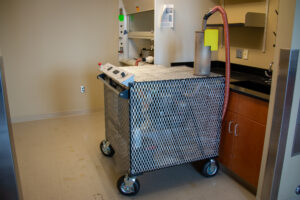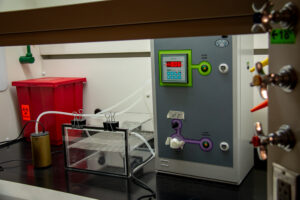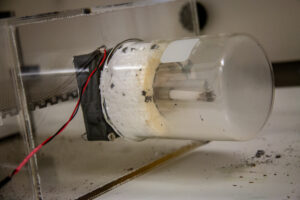Can a healthy diet combat the effects of pollution?
A diesel engine isn’t a typical piece of equipment found in a biology lab. But it’s just one of the unique lab instruments in the environmental toxicology lab of Giuseppe Valacchi, Ph.D., at N.C. State University’s Plants for Human Health Institute.
As part of his work at the institute, Dr. Valacchi researches how pollution affects human health. To do so, he exposes human tissue samples to pollutants in his lab; including exhaust from a diesel engine. In addition to the diesel engine, he has an instrument that “smokes” research-approved cigarettes to evaluate the effect of cigarette smoke (primary and second hand), an ozone generator and a solar simulator that tests the effects of ozone, ultraviolet radiation, respectively. Not only can he test these factors individually, but even together, in an enclosed chamber, to gauge additive effects and mimic “real life” exposure.

“We can create the urban environment in our lab,” Dr. Valacchi says. “We can simulate a smoker walking on the street in Miami Beach with a truck next to him that has its engine on, during a day when the ozone levels are high.”
He tests the effect of pollution exposure on the skin, lungs, eyes, and gastrointestinal tract. His lab generates these different tissue types, which have different oxygen tensions. This allows their research to simulate in vivo research because it mimics the real physiological condition of these tissues during the pollution exposure. Ultimately, they are able to assess the different effects of pollution exposure on different target organs.
The research is increasing our understanding of the impact of pollution on human health and how phytochemicals from foods may offer protective or healing properties. Pollution kills about seven million people around the world each year, contributing to health problems such as lung cancer, cardiovascular disease and skin conditions.
Pollution creates dangers that we don’t always realize, however. Dr. Valacchi says that some people mistakenly believe that pollution merely affects the beauty of skin. Instead the impact of pollution is not limited to only the superficial layer. He cites a correlation in China between higher ozone levels and increased visits to hospital emergency rooms for skin conditions like eczema or rashes. When the ozone levels decreased, so did the hospital visits.

“It’s a surprise to many people that pollution gets into our bodies through our skin,” Dr. Valacchi says. “Studies show that if I stand in a polluted room wearing a helmet that gives me oxygen—so the air I’m breathing is good—but I’m standing there in my underwear, I’ll have just as much pollution in my body as if I had breathed it in. Skin is our largest organ. It’s not just a barrier but a gateway.”
Pollutants can also attach to fabrics, posing another unexpected risk. Dr. Valacchi explains that cigarette smoke doesn’t only pose a risk through direct and second-hand contact, but through third-hand cigarette smoke. If someone smokes in a room, toxic particulates will collect in the curtains, carpet, and even in clothes, and it can survive in those fibers for 19 months. If someone opens and closes those curtains each day, it becomes a repeated exposure of toxic chemicals on that person’s skin.
The knowledge that Dr. Valacchi acquires in his lab has a deeply practical impact. By learning how our organs interact with various pollutants, he’s able to gauge the risks so that we can minimize the impact.
“If you know more, then you feel that you should be more responsible. You can do something different,” Dr. Valacchi says. “Maybe you don’t take you car somewhere, or you optimize your trip. Maybe you check the pollution levels to decide whether you work in your garden that day or stay inside. Little things add up.”

Knowing the degree to which skin leaves people vulnerable to the impacts of pollution also offers an unexpected way that people can combat the risks of pollution: through diet. By improving our diet to incorporate foods that contribute to healthier skin that is less penetrable by chemicals, we’re also building a shield of sorts against pollutants.
“Maybe we can understand how to counteract pollution while leading normal lives, just by changes to our diet,” Dr. Valacchi says. “This brings us to a big thing: precise nutrition. The idea is that we all respond differently to different foods. Maybe if you eat berries, your skin will be better. But if I eat berries, it won’t be enough for me; maybe I need to eat berries and chocolate.”
While we can’t clean the sky that we have, we can learn how to counteract the health effects of pollution. But thanks to a lab with a diesel engine, cigarettes, ozone generator and a solar simulator, one scientist is learning more about how pollution affects us – so then we can learn how we can defend ourselves against it and lead a healthier life.
- Categories: